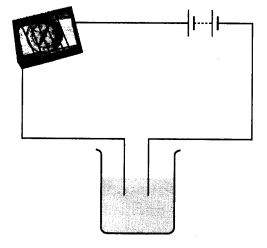Solutions For All Chapters Science Class 8
Question 1.
Fill in the blanks.
(a) Most liquids that conduct electricity are solutions of ______ , ______ and ______
(b) The passage of an electric current through a solution causes _______ effects.
(c) If you pass current through copper sulphate solution, copper gets deposited on the plate connected to the ________ terminal of the battery.
(d) The process of depositing a layer of any desired metal on another material by means of electricity is called _______
Answer:
(a) acids, bases, salts
(b) chemical
(c) negative
(d) electroplating
Question 2.
When the free ends of a tester are dipped into a solution, the magnetic needle shows deflection. Can you explain the reason?
Answer:
The deflection in magnetic needle shows that the circuit is complete and the solution conducts electricity, i.e., it is a good conductor.
Question 3.
Name three liquids, which when tested in the manner shown in Fig. 11.9. may cause the magnetic needle to deflect.
Answer: Vinegar, lemon juice and tap water.
Question 4.
The bulb does not glow in the setup shown in Fig.11.10. List the possible reasons. Explain your answer
Answer:
The bulb may not glow because of the following reasons:
(i) The wires in the circuit may be loosely connected.
(ii) The bulb may be fused.
(iii) The cells may be used up.
(iv) The liquid may be an insulator, i.e., a poor conductor of electricity.
Question 5.
A tester is used to check the conduction of electricity through two liquids, labelled A and B. It is found that the bulb of the tester glows brightly for liquid A while it glows very dimly for liquid B. You would conclude that
(i) liquid A is a better conductor than liquid B.
(ii) liquid B is a better conductor than liquid A.
(iii) both liquids are equally conducting.
(iv) conducting properties of liquid cannot be compared in this manner.
Answer: (i) liquid A is a better conductor than liquid B.
Question 6.
Does pure water conduct electricity? If not, what can we do to make it conducting?
Answer:
No, pure water doesn’t conduct electricity. But when salt is dissolved in pure water, it conducts electricity.
Question 7.
In case of a fire, before the firemen use the water hoses, they shut off the main electrical supply for the area. Explain why they do this.
Answer:
The water used in the water hoses is not pure water and is a good conductor of electricity. So, the fire¬men shut off the electric supply before spraying water to save themselves and other people from electrocution.
Question 8.
A child staying in a coastal region test the drinking water and also the seawater with his tester. He finds that the compass needle deflects more in the case of seawater. Can you ex¬plain the reason?
Answer:
The seawater contains a huge amount of salts in comparison to drinking water, hence the seawater is a better conductor of electricity and it produces a stronger magnetic field in the wire and hence deflects the compass needle more.
Question 9.
Is it safe for the electrician to carry out electrical repairs outdoors during heavy downpour? Explain
Answer:
No, it is highly dangerous to carry out the electrical repairs outdoors during the heavy downpour. It can cause electrocution, as water is a good conductor of electricity.
Question 10.
Paheli had heard that rainwater is as good as distilled water. So she collected some rainwater in a clean glass tumbler and tested it using a tester. To her surprise, she found that the compass needle showed deflection. What could be the reasons?
Answer:
Rainwater is pure water which is an insulator but it gets mixed with air pollutants like sulphur dioxide and nitrogen oxides and form acidic solution, which is a good conductor of electricity. So, the compass needle showed deflection.
Question 11.
Prepare a list of objects around you that are electroplated.
Answer:
Objects that are electroplated are door handles, taps, rims of cycles, showers, the handlebar of cycles and bikes, gas burner, tin cans, metallic almirahs, buckles of belts, etc.
Question 12.
The process that you saw in Activity 14.7 is used for purification of copper. A thin plate of pure copper and a thick rod of impure copper are used as electrodes. Copper from impure rod is sought to be transferred to the thin copper plate. Which electrode should be attached to the positive terminal of the battery and why?
Answer:
The thick rod of impure copper plate is to be attached to the positive terminal of the battery because when electric current is passed through the copper sulphate solution, it gets dissociated into copper and sulphate. The free copper, being positively charged, gets drawn to the negative terminal of the battery and gets deposited on it. On the other hand the loss of copper from the solution is regained from the impure copper rod which is attached to the positive terminal of the battery.



Understandable answers and easy to learn